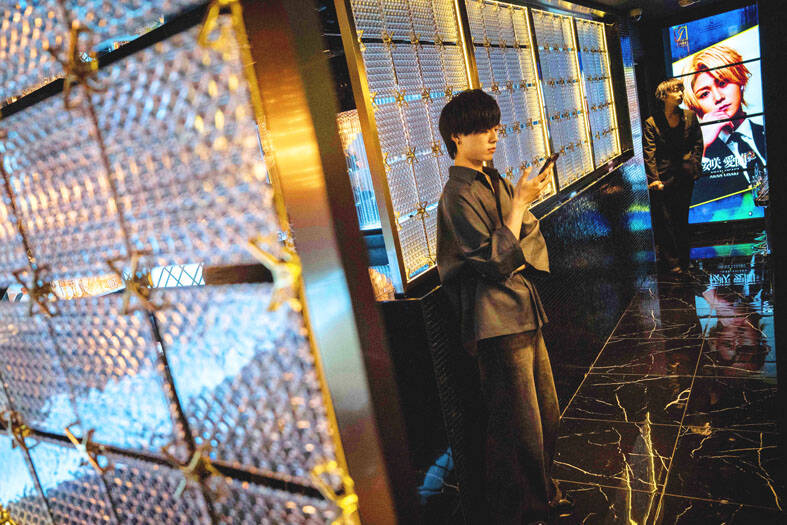Japan is waging war on “host clubs” — where men entertain women willing to pay for romance, but authorities and industry insiders said customers have long been scammed and saddled with debt.
Neatly coiffured, well-dressed “hosts” bedazzle women with sweet talk and the mirage of intimacy at glitzy establishments in big Japanese cities.
In return, the women pay inflated prices for champagne and other expensive drinks while they flirt, sometimes splurging tens of thousands of dollars a night.

Photo: AFP
Authorities are clamping down because of allegations that some women are being tricked into towering debts by hosts, and even into sex work to pay them off.
Under a new law that took effect last month, taking advantage of women’s romantic feelings to manipulate them into ordering overpriced drinks has been banned.
That sent shock waves through an industry where pseudo-romance, from casual flirtation to after-hours sex, has long driven relationships with clients.
John Reno, a star host in Tokyo’s red-light district Kabukicho, said the crackdown was “unsurprising” after “scammer-like hosts increased.”
Hosts used to employ intimacy primarily to entertain women, he said.
However, “their mindset today is basically ‘if you love me, then don’t complain,’ silencing women and exploiting their emotional dependence,” the 29-year-old owner of Club J said.
A growing number of victims have reported financial and sexual exploitation linked to such establishments.
Official data showed that about 2,800 host club-related cases were reported to police last year, up from 2,100 two years earlier. They ranged from hosts ordering drinks the clients did not ask for, to prostitution.
Some hosts are racking up profits by introducing their cash-strapped clients to brokers known as “scouts,” who send them into the sex trade, police say.
Women, for their part, strive to work hard for their crush.
“These hosts in return promise them their effort will be rewarded with actual relationships or marriage,” Reno said.
“That’s outright fraud,” he added, while denying that his Club J employees engage in any such practices.
Difficulties such as poverty and abuse often make hosts the only escape for young women with low self-esteem, campaigners said.
While high-flying businesswomen used to be the main clientele, girls “with no place to be” are increasingly seeking refuge, said Arata Sakamoto, head of Kabukicho-based nonprofit Rescue Hub.
To them, “host clubs have become a place where they feel accepted” and “reassured they can be who they are, albeit in exchange for money,” he said.
On one night a 26-year-old woman was surrounded by smiling men at a table of flamboyant Kabukicho club Platina.
“Some hosts are bad enough to brainwash you, but I would say women should also know better than to drink far more than they can afford,” the woman, a freelancer in the media industry who declined to be named, said.
Another customer said she comes to Platina to “spice up my mundane life.”
“I hope this will remain a place that keeps my female hormones overflowing,” the 34-year-old information technology worker said.
The new law does not ban intimacy, but behavior such as threatening to end relationships with clients if they refuse to order drinks.
Industry insiders such as Platina owner Ran Sena call the law “too vague.”
“For example, if a client tells me: ‘I’m about to fall in love with you,’ does that mean I’ll have to forbid her from coming to see me again?” he said.
Another disruptive change is also rocking the industry. Police have notified clubs that any billboard advertising that hypes up the sales and popularity of individual hosts is no longer acceptable. The rationale is that such bombastic, neon-lit signs boasting “No. 1” status or “multimillion” sales can fuel competition among hosts and push them further toward profit-mongering.
That signals a “huge” morale crisis for hosts, Sena said.
“It’s been the aspiration of many hosts to be called No. 1, earn a title and become famous in this town,” he said.
“Now, they don’t even know what they should strive for,” the 43-year-old added.

Shamans in Peru on Monday gathered for an annual New Year’s ritual where they made predictions for the year to come, including illness for US President Donald Trump and the downfall of Venezuelan President Nicolas Maduro. “The United States should prepare itself because Donald Trump will fall seriously ill,” Juan de Dios Garcia proclaimed as he gathered with other shamans on a beach in southern Lima, dressed in traditional Andean ponchos and headdresses, and sprinkling flowers on the sand. The shamans carried large posters of world leaders, over which they crossed swords and burned incense, some of which they stomped on. In this

Near the entrance to the Panama Canal, a monument to China’s contributions to the interoceanic waterway was torn down on Saturday night by order of local authorities. The move comes as US President Donald Trump has made threats in the past few months to retake control of the canal, claiming Beijing has too much influence in its operations. In a surprising move that has been criticized by leaders in Panama and China, the mayor’s office of the locality of Arraijan ordered the demolition of the monument built in 2004 to symbolize friendship between the countries. The mayor’s office said in

‘TRUMP’S LONG GAME’: Minnesota Governor Tim Walz said that while fraud was a serious issue, the US president was politicizing it to defund programs for Minnesotans US President Donald Trump’s administration on Tuesday said it was auditing immigration cases involving US citizens of Somalian origin to detect fraud that could lead to denaturalization, or revocation of citizenship, while also announcing a freeze of childcare funds to Minnesota and demanding an audit of some daycare centers. “Under US law, if an individual procures citizenship on a fraudulent basis, that is grounds for denaturalization,” US Department of Homeland Security Assistant Secretary Tricia McLaughlin said in a statement. Denaturalization cases are rare and can take years. About 11 cases were pursued per year between 1990 and 2017, the Immigrant Legal Resource

‘RADICALLY DIFFERENT’: The Kremlin said no accord would be reached if the new deal with Kyiv’s input did not remain within the limits fixed by the US and Russia in August Ukrainian President Volodymyr Zelenskiy is to meet US President Donald Trump in Florida this weekend, but Russia on Friday accused him and his EU backers of seeking to “torpedo” a US-brokered plan to stop the fighting. Today’s meeting to discuss new peace proposals comes amidst Trump’s intensified efforts to broker an agreement on Europe’s worst conflict since World War II. The latest plan is a 20-point proposal that would freeze the war on its current front line, but open the door for Ukraine to pull back troops from the east, where demilitarized buffer zones could be created, according to details revealed by